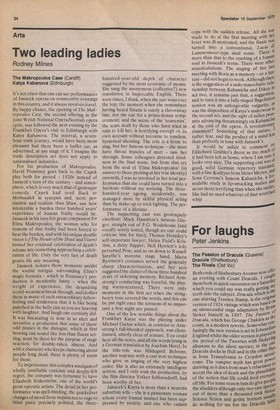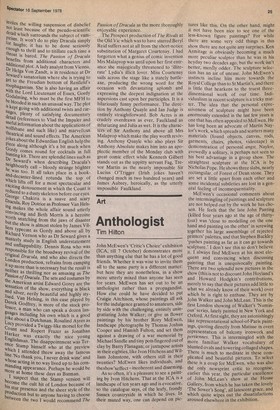For laughs
Peter Jenkins
The Passion of Dracula (Queens) Dracula (Shaftesbury) The Rivals (Old Vic) Both ends of Shaftesbury Avenue now oft an evening with Count Dracula. I caug",, them both in quick succession on a Saturda, which you could say was really getti i ng teeth into the subject. Dracula, one starring Terence Stamp, is the origin° version of 1924 vintage which was basedlii an unsuccessful stage adaptation by Br',1 Stoker himself in 1897. The Passiin Dracula, which has George Chakiris as "— count, is a modern rewrite. Somewhat fusmgly the new version is set in Edward,lail,. England whilst the older version is plaYeu. the period of the Twenties with flickerla; allusions to the silent movies; in the ()11s Dracula docks in Hull and in the other flied_ in from Transylvania to Croydon aer°4 rome: The vampire myth has great Pow',., deriving as it does from man's reluctance!' accept the idea of death and the plausibibriY of the notion that life could feed eternaliYe off life, For some reason bats do give pe°1? 5 the shudders although only two rare specie., out of more than a thousand suck blouit"' Science fiction and gothic horrors usual,Ye do nothing for me but the Dracula fabi invites the willing suspension of disbelief not least because of the pseudo-scientific detail which surrounds the subject of vampirism. It won't do to play Dracula simply for laughs; it has to be done seriously enough to thrill and to titillate each time a throat is bared. The Passion of Dracula benefits from additional characters and additional plot. A lady analyst from Vienna, Dr Helga Von Zandt, is in residence at Dr Seward's sanatorium where she is trying to get to the Freudian bottom of Renfield's zoophaganism. She is also having an affair With the Lord Lieutenant of Essex, Gordy Godalming, who must be the first MFH to be blooded in such an unusual way. The plot is kept going with additional twists and carRages, plenty of satisfying documentary detail (references to Vlad the Impaler and useful information about the applications of wolfsbane and such like) and marvellous theatrical and sound effects. The American Jokes about the Edwardian English help the Piece along although it's a bit much when Gordy comes round for cocktails in full hunting kit. There are splendid lines such as Dr Seward's when describing Dracula's neighbourly call — bloody strange blighter he was too. It all takes place in a bookand-decanter-lined rotunda the top of Which lifts off for a most spectacular and exciting donouement in which the Count is reduced to a dusty skeleton before our eyes. George Chakiris is a suave and scary Dracula, Roy Dotrice as Professor Van HeLsing makes the whole affair sound utterly Convincing and Beth Morris is a heroine worth snatching from the jaws of disaster but the show is almost stolen by James Villiers typecast as Gordy and above all by Richard Vernon who as Dr Seward gives a masterly study in English understatement and unflappability. Dennis Rosa who was responsible for the broadway revival of the original Dracula, and who also directs the London production, refrains from camping it up more than is necessary but the result is neither as thrilling nor as amusing as The Passion of Dracula. The sets and costumes by the American artist Edward Gorey are the sensation of the show, everything is black and silver, eerily beautiful and highly stylised. Van Helsing, in this case played by Derek Godfrey, is more of the stock professor, a man who can speak a dozen languages including his own which is a good Joke about a Dutchman. Rosalind Ayres as Lucy provided a Twiggy-like morsel for the Count and Rupert Frazer as Jonathan Harker was exactly the nice young Englishman. The disappointment was Terence Stamp himself who at the preview Which I attended threw away the famous line No thank you, I never drink wine' and Whose acting in no way lived up to his cornnaanding appearance. Perhaps he would be more at home these days as Batman. I suspect that the Stamp version will become the cult hit of London because of his star presence and the sheer style of the Production but to anyone having to choose between the two I would recommend The Passion of Dracula as the more thoroughly enjoyable experience.
The Prospect production of The Rivals at the Old Vic which was to have starred Beryl Reid suffers not at all from the short-notice substitution of Margaret Courtenay. I had forgotten what a genius of comic invention Mrs Malaprop was until upon her first entrance she majestically threatened to 'illiterate' Lydia's illicit lover. Miss Courtenay sails across the stage like a stately battleaxe, producing the wrong word for the occasion with devastating aplomb and expressing the deepest indignation at the aspersions cast upon her participles. It is a hilariously funny performance. The direction by Anthony Quayle and Ian Judge is entirely straightforward. Bob Acres is as crudely overdrawn as ever, Faulkland as infuriating and Julia as wet. It is the characters of Sir Anthony and above all Mrs Malaprop which make the play worth reviving. Anthony Quayle who also plays Sir Anthony Absolute makes him into an apoplectic member of the Monday club with great comic effect while Kenneth Gilbert stands out as the uppitty servant Fag, Trevor Martin as the nearly impossible Sir Lucius O'Trigger (Irish jokes haven't changed much in two hundred years) and James Aubrey, heroically, as the utterly impossible Faulkland.



































 Previous page
Previous page